Joyce Douville and her sister Margaret are not your average safety officers.
They don’t carry guns, they can’t make arrests and they don’t get involved in disputes.
But ask anyone in their small community of Teslin, Yukon, population 450, and they’ll tell you the sister matriarchs are helping keep community members safe.
Both in their late 60s, the “deadly aunties,” as they’re called in Teslin, are community safety officers for their First Nation, Teslin Tlingit Council (TTC).
Joyce says it’s a nickname they’re proud of.
“(Community members) just think we’re deadly because of our age,” she says.
The deadly aunties, the only officers in Teslin so far, are the eyes and ears of the community.
Unlike traditional policing, they’re the first point of contact for community members. Their focus is mainly on patrolling and minor safety issues like giving an intoxicated person a drive, making sure children get home safe from school and visiting Elder’s homes to check on them.
They also occasionally liaise with Teslin’s RCMP, which has three officers in the community.
Now six months on the job, it’s work the sisters enjoy and one that makes a difference.
They say their patrolling has prevented people from freezing, there’s been a decrease of children roaming around and vulnerable community members are feeling protected.
“They’re very happy with us,” says Joyce. “There’s a lot of elderly people here who are single and they’re so happy that we’re there, they feel safe in their homes. A lot of things could happen. We have a lot of hitchhikers in town.”
Jeff Myke, who is Mohawk and the program’s manager, came out of retirement as an RCMP officer to implement the program.
He says it functions as an “early warning system.”
“It’s a program that allows a more holistic approach to dealing with situations which frees up the RCMP to deal with more serious matters,” he says.
Myke says the program has been so successful TTC is hoping to hire more officers.
As TTC currently funds the program, Myke says he would like to see a night patrol program developed with financial backing from the federal government.
While he notes the community has typically had a pleasant relationship with the RCMP, the “deadly aunties’” familiarity with community members adds another level of trust.
“Historically there were some people that just don’t want to talk to the police, but… they’re more comfortable talking with us. Both Joyce and Margaret are able to do outreach due to their experience and knowledge of the community. It’s been very positive.”
The aunties say part of their success is their knack for making people feel at ease.
“We’re not wearing a full uniform,” Joyce says. “Even me, if I’m going to the RCMP I feel intimidated. We got a uniform and it’s just that. They feel good about it because they know us and they feel more comfortable.”
Read More:
Safety patrol formed after violent crimes mark Yukon community
N.W.T. pilot project ‘connecting with people’ on personal level without using police
Program across Yukon
TTC’s program was developed under the Indigenous Community Safety Partnership Program, led by Gina Nagano’s safety consulting firm, the House of Wolf and Associates.
Nagano’s firm works with individual First Nations communities to assess what their community safety needs are and customizes a program that incorporates communities’ culture, values and people.
Nagano says the program is “revitalizing those traditional laws of respect.”
“Policing in our communities has been really reactive, there’s been this colonial approach. Working with Indigenous communities and understanding Indigenous laws and Indigenous ways, part of it is respecting that community,” she says.
Nagano, a Tr’ondëk Hwëchin First Nation citizen, is a retired RCMP sergeant and previously worked with the Kwanlin Dün First Nation (KDFN) in Whitehorse to develop their community safety program.
She says the idea for the program was born out of their community safety assessment as KDFN wanted to improve policing and build trust with community members.
That program succeeded in reducing the number of calls to the RCMP and has now grown to include Selkirk First Nation in Pelly Crossing and is launching in Carcross/Tagish First Nation in Carcross.
Nagano says more First Nations in Yukon are working with her to develop their own program and other Indigenous communities from across Canada have also expressed interest.
Earlier this year the program won the $500,000 Arctic Inspiration Prize which Nagano says will be used to create a manual for trainers and develop a four-week safety officer program.
The winnings will also go towards holding a summit in Whitehorse in August which will focus on best practices around community safety, how to conduct a community assessment and emergency preparedness regarding climate mitigation.
Nagano says the program is worth First Nations investing in.
“My advice would be for every Indigenous community in Canada, let alone the world look at the program…It addresses the social issues in the community, it addresses the colonization, it acknowledges it and it allows communities to heal as a whole and move forward in a good way.”
Margaret says she ultimately hopes the deadly aunties will inspire youth to get involved with community safety.
“We try to do our best working in our community. The younger generation could look up at us and say ‘maybe, gee maybe, that’s what I want to be one day.’”









